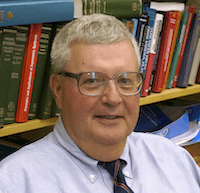Andrew S. Kende
1932 – 2018
Andrew S. (Andy) Kende was born in Budapest Hungary in 1932. With World War II impending, his family immigrated to the United States in 1939 settling in the Bronx where he received his earliest schooling. The family relocated to the suburb of Evanston, IL, where Andy was educated through high school. A portent of things to come, he later described being fascinated with chemistry at six years old: “It’s always seemed to me an interesting way to structure information,” he said. “Things relate in a sensible way.”
At an early age, Andy exemplified the excellence he would later encourage in his students. He was the winner of the National Westinghouse Science Talent Search at age 13 where he bested a future National Academy member and former President of the American Chemical Society Ronald Breslow, who as fate would have it, would later become Andy’s graduate school lab mate at Harvard. At 16, he enrolled at the University of Chicago. After earning a 2-year A.B. degree, Andy moved to Florida State University to for his B.S. in chemistry. He received his Ph.D. degree in Organic Chemistry in 1957 at Harvard working with the Nobel Laureate Professor Robert B. Woodward. His doctoral work elucidated new pathways for the reactions of aliphatic diazo compounds with ketenes and led to the first spectroscopic characterization of pure cyclopropanone. With the assistance of an NRC-American Cancer Society Postdoctoral Fellowship (1956-57), Andy moved from Harvard to the UK’s University of Glasgow to work with another Nobel Laureate, Sir Derek H. R. Barton, where he demonstrated the structure of the major photoisomerization product of dehydroergosteryl acetate.
Andy joined Lederle Laboratories in 1957-1958 where his excursion into natural products chemistry continued as part of the team that synthesized the antibiotic tetracycline. In 1968, Andy accepted an appointment as Professor of Chemistry at the University of Rochester. His research program there focused on three principal themes: early work in organic photochemistry, pericyclic reactions, and total synthesis.
Andy joined the editorial board of Organic Reactions in 1970 while William Dauben was Editor-in-Chief. During his twelve-year term on the editorial board, Organic Reactions published ten volumes. Because of Andy’s avid interest in the Organic Reactions organization, he was elected to membership on the Board of Directors in 1980. He assumed the role of Editor-in-Chief in 1984 and held that position for five years before handing the mantle to Leo Paquette. Andy remained on the Board of Directors until his resignation in 2013. During his four decades with Organic Reactions, Andy was responsible for the appointment of an additional Editorial Board secretary. This position was required as Organic Reactions grew from publishing roughly a single volume annually to its current multiple volumes a year.
Andy was also a member of the Editorial Board and Editor of Volume 64 of Organic Syntheses. He subsequently joined the Board of Directors and served as President of Organic Syntheses, Inc. from 2002-2012. In this latter role, he oversaw the beginning of Organic Syntheses transition from a purely print format to the current electronic and print publications.
Because of Andy’s well-known fondness for good food and wine, combined with his involvement in both the Organic Reactions and Organic Syntheses organizations, there was a good-spirited competition of the organizations’ dinners held at each annual or bi-annual meeting to determine which dinner was “best.” Andy, of course was the sole judge.
Andy held many honors. He was an associate editor of the ACS Journal of Organic Chemistry for 12 years. He was a member of the Editorial Advisory Boards of Chemical Reviews, and Synthetic Communications. Andy’s held a Guggenheim Fellowship and presented invited lectures, including several Gordon Conference lectures, NSF Workshops in Natural Products Chemistry, and the International Symposium on Anthracycline Chemistry, as well as plenary lectures at the Royal Society of Chemistry, the International Conference on Heterocyclic Chemistry, and the Medicinal Chemistry Symposium. He was awarded a Japan Society for Promotion of Science Fellowship and also received an ACS Cope Senior Scholar Award. Several of Andy’s compounds were patented and he was chosen ‘inventor of the year’ by the Rochester Patent Law Association in 1979.
After his retirement from teaching 1998, he continued productive research until 2002, when Andy and his wife Fran moved to Scottdale, AZ. During the next 16 years, Andy and Fran continued to indulge their passion for travel and good food. Andy was a lifelong lover of good food of all types (particularly meat and potatoes but famously not fish), prepared and served well. As in everything he did, he brooked no incompetence in either area.
Andy demanded excellence from all of those around him; students, staff, and faculty. His vision, imagination, and vast knowledge of organic chemistry were a valuable resource and set a standard which I tried to emulate. His selfless and energetic service to the field of organic chemistry was exemplary, a standard for all to strive. Andy enjoyed teaching and was demanding instructor, but his real thrill was in mentoring and training his graduate students. He mentored over 50 postdocs and 50 graduate students during his career. At Rochester, Andy had the reputation for demanding scientific excellence and would not settle for less than the pursuit of science at the highest level. The lessons they learned from him – about chemistry, about working hard and achieving excellence – have remained with them over the years.
Yuh-geng Tsay, an early Ph.D. student, remembers that whenever Andy returned from a business trip, “he would stop by the lab first to see how everyone was doing. This type of work ethic has inspired us not only to work hard, but to have a sense of urgency in everything you do. His teaching style empowered us to solve any technical challenge and to be independent problem solvers.”
Lanny Liebeskind, a Ph.D. student in the mid ‘70’s, remembers walking into Andy’s lab for the first time as a new graduate student. “I remember asking Andy when I should start my research. His succinct answer, in effect, was ‘Now!’” says Liebeskind, the vice provost for strategic research initiatives and Samuel Dobbs Professor of Chemistry at Emory University. “I got the message loud and clear. It was a bit like being dropped into a professional sports team where the coach is constantly challenging you to push yourself beyond the comfort level. In doing so, you grew in ways as a scholar and person that you never would have on your own.” Tsay had a similar experience. “When I toured Professor Kende’s labs, I noticed there was a memo from him posted in each cubicle of his graduate students and postdocs. Two key phrases stood out that got my attention. ‘When you are here, you should roll up your sleeves and work. If you cannot manage at least two experiments at the same time, you don’t belong in this group.’”
In 1980 while Chair, Andy Kende recruited me to Rochester to join him and Dick Schlessinger as part of a group doing complex molecule synthesis. I will always be grateful to him for this opportunity that has done so much for my career and me personally.
Andy and Fran were also justifiably immensely proud of the their son Mark, who has gone on to considerable distinction in academia as a constitutional law scholar holding the James Madison Chair in Constitutional Law at the Drake University School of Law.
We, his friends and colleagues, were shocked to learn of Andy Kende’s untimely passing on February 20, 2018 at the age of 85. Andy, as Fran will attest, was an intensely private person. I had last seen Andy in late December 2017 during what had become an annual occurrence over the last 10 years as my wife and I visited the Phoenix area, where her immediate family resides, for the Christmas holidays. We along with our wives shared a hearty meal of Andy’s favorites: meat and potatoes. Nothing prepared me for the call I received from Fran on February 21, 2018 informing me of Andy’s passing from complications of renal cancer.
Andy rest in peace, we all will miss you on so many levels, as a scholar, as a teacher who trained your students to carry on your high standards of scientific rigor and excellence, and for your unselfish service to your science and your profession. Godspeed.
June 6, 2018
Robert K. Boeckman Jr.
Marshall D. Gates Jr. Professor of Chemistry
University of Rochester
Rochester, New York


